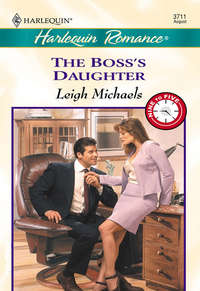
Полная версия
The Billionaire Bid
The anchorman shook his head sadly. “What a shame. Is there any word of what will happen to the building, Carla?”
“That question was asked at the press conference, Jason, but Mr. Kerrigan would only say that he had made no plans.” She smiled coyly. “However, we did get a hint that he’s negotiating a deal of some sort with the Kerrigan County Historical Society museum.”
Gina’s wooden spoon slipped and hot oil and vegetables surged over the edge of the pan onto her index finger. Automatically she stuck the burned tip in her mouth.
The reporter went on, “The museum’s curator, Gina Haskell, was at the press conference but refused to comment—”
Gina stared unbelieving at the reporter. “I didn’t refuse to comment,” she protested. “I told you there was nothing going on!”
“—and when I talked to the president of the historical society just now, he would only say that it would be a crime for such a landmark building to be destroyed.”
Gina put her elbows on the edge of the counter and dropped her head into her hands. They’d actually called her boss for a comment. The boss she hadn’t bothered to tell about the events of the day, because her harebrained notion had come to nothing.
“Indeed it would be a crime,” the anchor broke in.
The reported nodded. “However, an arrangement like that would be a first for Dez Kerrigan. He admitted today that in his entire career in property development he’s never preserved a building.”
“Hard to believe,” the anchor said. “Keep us posted on the historical society’s preservation efforts, Carla.”
“What preservation efforts?” Gina groaned.
The phone rang. She stared at it warily, but she knew that putting off answering wasn’t going to make the president of the historical society any easier to deal with. The trouble was that she didn’t blame him for being furious with her. At least he hadn’t told the reporter that the whole thing was news to him.
But the caller wasn’t her boss. The voice on the other end of the phone was one she’d heard just once before, but she recognized it instantly. It was rich, warm—and arrogant.
“You have quite a grip on the media, don’t you?” Dez accused. “Yesterday it was the newspaper, and today the TV station. What’s next—rallying your troops by satellite?”
“I didn’t do anything,” Gina protested, but she found herself talking to a dead line.
Though she wasn’t inclined to be sympathetic, she could understand why Dez Kerrigan was annoyed at being made to sound like a criminal. He’d asked for it, of course. More than ten years in the business of buying and selling property, of building and developing real estate, and he’d never saved a building? Still, she didn’t exactly blame him for being exasperated. She was sure he had his reasons for knocking down every building that passed through his hands—inadequate though the justification might sound to ordinary people. People like her.
Being made to sound like a criminal…
Now that, she mused, might just offer some real possibilities.
It was ten in the morning, exactly twenty-four hours since their encounter in the hotel ballroom, when Gina walked into Dez Kerrigan’s office.
It hadn’t been easy to find him. There was no Kerrigan listed in the telephone book—not that she’d expected his home number to be published. What she had expected to find was a Kerrigan Corporation or a Kerrigan Partners or a Kerrigan-something-else. But there was nothing like that either.
Of course, she reflected, the mere fact that a man hadn’t named his business after himself didn’t necessarily mean the business wasn’t a monument to his ego. Maybe he just liked being able to deny responsibility once in a while—and that would be harder to do with his name actually blazoned on every site he touched. Or perhaps he thought that the name had lost its impact, since it was now associated with everything from Kerrigan County itself to Kerrigan Hall over at the university, and a whole lot of stuff in between.
Eventually she located his business. He’d named it Lakemont Development, as if to say it was the only company in town that mattered. While she didn’t doubt that if Dez Kerrigan had his way, his fingerprints would be all over any significant building which took place in the city, Gina thought it was hardly a less egotistical choice than naming it after himself.
Even after she’d found his business, however, she still had a fair journey before finding Dez Kerrigan himself. Lakemont Development had offices spread all over the city, and she’d called each of them in turn, starting with the shiniest glass-and-steel tower in Lakemont and working her way down until finally a receptionist admitted, cautiously, that Mr. Kerrigan did indeed have an office in that particular building and that he was on the premises today.
Gina didn’t leave her name—she just went straight over. It was only a few blocks from the museum, but she’d never noticed the building before. And no wonder it hadn’t caught her eye, she thought as she approached. It looked like a converted school building—one that had been abandoned when the city’s population had shifted to the suburbs. Hardly the kind of place where she’d expect to find the headquarters of somebody who played with skyscraper towers as if they were building blocks.
Inside, the building was quietly bustling. She found her way down a long corridor to Dez Kerrigan’s office.
His secretary fingered Gina’s business card and looked at her doubtfully. Gina wasn’t surprised; the words “historical society” must be something of a red flag with any of Dez Kerrigan’s employees.
“I don’t have an appointment,” she admitted to the secretary. “But I imagine he’s been expecting me to drop in. You may have seen on the news last night that we’re negotiating a deal on the Tyler-Royale building.”
The secretary’s eyes widened, but she didn’t comment. She picked up the telephone, and Gina sat down in the nearest chair. She hoped she was making the point, as quietly and clearly as possible, that she wasn’t going to move until she’d seen the boss.
A few minutes later the door of Dez Kerrigan’s office opened. “Well, if it isn’t the media magnet in the flesh,” he said. “Come in.”
Gina put aside her magazine and took her time crossing the small waiting room to the inner office. He stepped back and gestured her inside with elaborate politeness.
He really was as tall as she’d thought, that day in The Maple Tree. At the press conference, she’d been too preoccupied to notice much, but now she remembered how far she’d had to look up into those odd hazel-green eyes. They didn’t look like emeralds today, she noted. That was all right—she wasn’t here to amuse him.
She paused just inside the door and looked around thoughtfully. “This isn’t anything like I expected.” The room was large—obviously it had once been a classroom—and the wall of windows and the neutral color scheme made it look larger yet. Nearly everything was various shades of gray—walls, carpet, sofa, window blinds. The desk looked like ebony. Only the art—mostly watercolors of buildings—added color. She waved a hand at a stylized drawing of a skyscraper. She recognized it—Lakemont Tower, one of the city’s newest and grandest. “That’s one of your projects, of course.”
He nodded.
“As towers go, it’s not bad. At least it has some class. But I expected you’d have your office there, with a gorgeous view over Lake Michigan.”
Dez shrugged. “This office was good enough for me when I started the company, and it’s still good enough. Besides, offices at the top of Lakemont Tower command a very high price. Why tie up the space myself when I can rent it out for good money?”
“Oh, yes,” Gina mused. “I remember now. You told the reporters yesterday that you’re the practical type.”
He frowned a little. “I didn’t realize you stayed around for the whole press conference.”
“I didn’t. But I watched the report on the late news, too. They had more footage from the press conference then, and there you were, big as life. ‘I’m a businessman,’” she quoted. “‘I’ll consider any reasonable option that’s presented to me.’”
“What about it? It’s not like I’m admitting to a secret vice. Look, it’s charming that you stopped by—it would have been even more charming if you’d brought a nice hazelnut coffee, but I won’t hold that against you this time. However, as much as I’d like to chat, I do have things to do today.”
Gina sat down on one end of the couch. “Of course you do. So I’ll come to the point. I have a reasonable option for you to consider.”
“Reasonable is a relative term. Unless you have the cash to buy me out—”
“No. I don’t.”
“Then please don’t waste my time lecturing me about why I should preserve the Tyler-Royale building. Obviously you didn’t hear the entire press conference or you’d know better than to try.”
“I don’t intend to do anything of the sort.” She crossed her legs just so, put her elbow on the arm of the couch, propped her chin against her hand, and smiled. “I’m here this morning to give you the chance to be a hero.”
Dez looked at her in disbelief. She was going to offer him a chance to be a hero? The woman had lost her mind. If she ever had one to begin with. “Ms. Haskell—” he began.
“Oh, call me Gina—please. I don’t blame you for being upset last night,” she went on with a sympathetic tone that was so palpably false that it made the air feel sticky.
“Upset?” he snorted. “I don’t get upset.”
“Really? Then why did you call me up and yell at me?”
Dez was honestly taken aback. “I didn’t yell at you.”
“Oh? I suppose that’s what you call calmly expressing an opinion?”
“It sure as hell is. I wasn’t yelling. I admit I was annoyed at the way that pack of jackals twisted my words, especially when I thought you might have fanned the flames, but—”
She nodded. “That’s what I said. You were…” It was obvious that she saw the expression on his face, for she broke off abruptly. “The news reports made you sound like King Kong, stomping around the city knocking down every building in sight. Of course you were put out by such unfair reporting.”
“Lady, if I got upset every time a bunch of reporters took after me, I’d be living on antacids.” He threw himself down on the opposite end of the couch from her. “Now what’s this about you making me a hero?”
“It won’t be my doing, really. I’m just here to show you the way.”
She shifted around to face him, and her skirt slid up an inch, showing off a silky, slim knee. The maneuver didn’t look practiced, but that only demonstrated how smooth an operator she was. “You’ve got about two minutes before I throw you out,” Dez warned.
“Very well.” With an unhurried air, she consulted her wristwatch, then settled herself more comfortably on the couch. “The media seems to have decided that you’re public enemy number one. And you must admit that you’ve played right into their hands. Really—after all these years, and after all the projects you’ve been involved in, you’ve never yet found yourself owning a building that was worth saving?” She shook her head in apparent disbelief.
“Only this one.”
She looked around the room. “And it’s starting to get some age on it. Be careful, or one of these days you’ll find yourself preserving a historic structure in spite of yourself.”
“There’s nothing historic about this building, and I’ll keep it for exactly as long as it suits my purpose. Look, sweetheart, if you think I’m going to let the opinions of a few reporters keep me awake nights, you’re wrong. They’ll forget about saving the Tyler-Royale store just as soon as another story catches their interest. This will pass—it always does.”
She kept smiling. “Sure about that, are you?”
The fact that her voice was practically dripping honey didn’t lessen the threat that lay underneath the words. The antacids were starting to sound like a good idea after all.
“But why make it hard on yourself?” she went on. “You already own eight square blocks of downtown Lakemont. Or maybe it’s even more than that—those were just the properties I found listed in a quick search at the county assessor’s office this morning.”
He had to hand it to her; she’d done her homework.
“To a tycoon, what’s one block more or less?” she went on. “The media have adopted the Tyler-Royale building as their darling. If you save it, you’ll be—”
“Lakemont’s own superhero,” he mused. “If you asked me, I’d say you’ve been reading too many comic books. Just for the sake of argument, exactly what kind of plan do you have in mind for saving the building? I suppose you want me to just hand it over to you?”
“Well, not to me personally, of course. But just think how marvelous you’d look if you gave it to the Kerrigan County Historical Society.”
“Well, if all the goodwill in the world was resting on it, I couldn’t do that. Remember? I don’t own the building. I suppose I could give you the option to buy it, if I happened to be in the mood to donate something that cost me a couple of hundred thousand dollars, but what good would that do? You told me a few minutes ago you don’t have any money. An option to buy is worthless if you don’t have the cash to exercise it.”
“I’m sure you could help me encourage your friend the CEO to donate the building. It’s not as if he wouldn’t be getting anything out of the deal, after all—”
“Now you’re onto something,” Dez pointed out. “He’d still have my two hundred grand, so he’d be happy. You’d have the building, so you’d be happy. And I’d be left holding the bag. Unfortunately for your argument, that doesn’t make me look heroic. It makes me look stupid.”
“Generous,” she corrected gently. “Of course, you’d also be getting a nice tax deduction.”
He couldn’t help but be impressed. There weren’t many people who could be on the receiving end as he demolished their line of reasoning and still keep smiling like that. He wasn’t sure if it was naiveté or chutzpah she was displaying, but she hadn’t wilted, and that was saying something.
“And,” she went on smoothly, “you really shouldn’t underestimate the value of improving your reputation.”
“By all means, I won’t underestimate it. Doing something like that would land me on the hit list of every fund-raiser and con artist in this corner of the state. You know, it would serve you right if I did hand over the option and convince Ross to sell you the building for a dollar or two. Have you actually looked at that store?”
For the first time, uncertainty flickered in her face, though she tried to mask it quickly. “Not lately,” she admitted.
“Well, you are in for a treat.” He jumped up and pulled open the office door. “Sarah, if anybody comes looking for me, just tell them that I took Ms. Haskell for a walk.”
It was only a few blocks from Dez’s office to the Tyler-Royale store, and his long legs ate up the distance. “Taking me for a run is more like it,” Gina said, sounding breathless.
He looked disparagingly down at the strappy sandals she wore. “If you’d choose some sensible shoes, you wouldn’t have so much trouble keeping up.”
“And if you weren’t so tall…” She stopped dead on the sidewalk in front of the main doors, looking up, and a large woman who was carrying a stack of boxes and half a dozen loaded shopping bags almost mowed her down.
Dez pulled her out of the line of traffic just in time and followed her gaze as she surveyed the front facade of the building. “What’s the matter, Gina?” he hazarded. “Is it a little larger than you remembered?”
“I was just thinking it looks too busy for a store that should be closing.”
Sure she was. He’d seen the way her eyes had widened as she’d taken in the sheer size of the place. But he’d play along—for a while—and let her save face.
Besides, she was right about the store being busy. People were streaming into and out of every entrance. Dez shrugged. “That happens all the time. People only realize what they have when they’re told it’s going to disappear. There will be a last burst of interest, and then everybody will forget about it and move on to the next store. By this time next year, if you stand on this corner and ask people what used to be here, only about half of them would even be able to tell you.”
“Especially if what’s here in a year is only an empty hole.”
He shot a suspicious look at her, but she returned it blandly.
“Come on,” Dez said. He gave the revolving door a push for her.
Just inside, a woman in a dark suit was offering samples of perfume. Gina paused and held out her wrist. Dez suspected she did it more to annoy him than because she wanted to try the scent. “The shoe department’s just over there if you want to take a look,” he suggested.
She sniffed delicately at the perfumed pulse point. “Oh, no. I wouldn’t dream of taking up your valuable time with shoes. Or perhaps I should say I wouldn’t follow your advice anyway, so I’d rather not have to listen to it.”
He ushered her between the makeup counters, past fine jewelry and antique silver, to the atrium lobby. The floor was tiled in a brilliantly-colored mosaic, spirals and scallops swooping in an intricate pattern. At the center the tiny tiles formed a stylized red rose, the symbol of the department store chain. Dez led her to the heart of the rose. “Stand right here,” he said.
“What’s the big deal? Everybody in Lakemont has done this a million times. ‘Meet me on the rose’ is part of the vernacular.”
“I know, I know. My mother made me report here, too. But that’s not why I brought you. Look up.”
For an instant he caught an odd expression in her eyes, something that looked almost like pain. What had he said to cause that reaction? Then she followed instructions, raising her eyes to the stained-glass dome seven stories above their heads.
If that didn’t make her see the light, Dez thought, nothing would. He’d almost forgotten himself how immense the building was, how the rows of white-painted iron balconies seemed to go on forever, up seven floors and out for what seemed miles.
She turned back to Dez. “And the point you’re trying to make is…?”
The nonchalant tone didn’t fool him. “The point is that even if you got this building for free, you couldn’t handle it. You couldn’t afford to keep the lights on, much less heat and cool it.”
“It’s a little bigger than what we have now, of course,” Gina conceded.
Dez stared at her for a minute, and then he started to laugh. “Oh, that’s rich! It’s like saying that Lake Michigan is a little bigger than the puddle you stepped over at the curb on our way inside.”
“And it’s a well-known phenomenon that when a museum expands, not only the number of visitors increases but donations do as well.”
“In your dreams.” He extended an index finger upward and drew an imaginary circle that took in the whole building. “Get real, Gina. Give it up. Maybe there’s another building somewhere that would actually be practical.”
She shook her head. “You don’t understand, do you? Another building might be more practical, but this is the one that’s captured people’s hearts. This is the one that has aroused their feelings.”
Foreboding trickled through his veins.
“I’d be a fool to give up on this,” she said, as if she savored the words.
Not as much of a fool as if you hang on to it, he wanted to say.
“It’s a cause, you see—almost a crusade. It’s already building momentum.” She had the nerve to smile at him, as she added sweetly, “And all I have to do is feed it a little.”
CHAPTER THREE
DEZ stared at her for so long that Gina thought perhaps he’d gone into a catatonic state. But even when he finally blinked and shook his head as if he was trying to clear it, he didn’t say anything to her. Instead, he pulled his cell phone off his belt and without looking at it punched two keys. “Sarah, cancel my lunch meeting.” He didn’t wait for an answer. “Come on. Let’s find a place where we can sit down and talk sense for a change.”
Gina shook her head. “No, really,” she said. She tried very hard not to let irony seep into her voice, and she almost succeeded. “You mustn’t put yourself out for my sake. It’s quite useless to try to convince me.”
“It’s not you I’m worried about. If you were the only one who’d be affected by this idiotic idea, I’d stand by and watch while you walked out in front of the freight train.”
Well, that was brutally frank, Gina thought. “Thank you.”
He frowned. “For what?”
“Confirming my suspicions that you’re not nearly as unconcerned about your public image as you pretend to be.”
“You think this is about my image?” He made a sound that could charitably have been called a snort. “The tearoom on the sixth floor is probably the quietest place in the building at this hour.”
“And I seem to recall they have hazelnut coffee,” Gina murmured.
“Hey, you can’t blame me for wanting to get something pleasant out of this. Though if you’d rather, we could stop on the fifth floor instead.”
“What’s there?” Gina asked warily.
“Hot tubs. They usually keep at least one full of water as a demonstration model.”
“On second thought, coffee sounds like a great idea.” She paused beside the Art Deco elevator and with the tip of her index finger traced the pattern overlaid on the cool gray metal. “Elevators. Already installed. And such nice ones, too.”
“They’re the originals,” Dez countered.
“I know. They’ll be like an exhibit themselves.”
“You can look at them and romanticize their history if you want, but all I see is old machinery that needs an expensive overhaul—if it isn’t obsolete altogether.” He punched at the sixth-floor button with his fist.
Конец ознакомительного фрагмента.
Текст предоставлен ООО «ЛитРес».
Прочитайте эту книгу целиком, купив полную легальную версию на ЛитРес.
Безопасно оплатить книгу можно банковской картой Visa, MasterCard, Maestro, со счета мобильного телефона, с платежного терминала, в салоне МТС или Связной, через PayPal, WebMoney, Яндекс.Деньги, QIWI Кошелек, бонусными картами или другим удобным Вам способом.











